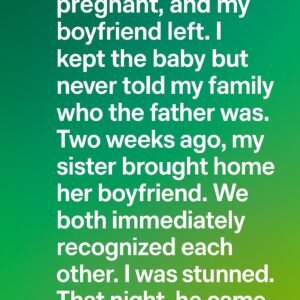Sunday lunches at my mother’s house had always been a family ritual. The kitchen smelled of roasted chicken, mashed potatoes, and the faint sweetness of peach cobbler cooling on the counter. Everyone—my two brothers, their wives, kids, and my mother—was gathered around the oak dining table. We were in the middle of passing plates and laughing about something trivial when it happened.
My niece, Chloe, a lively eleven-year-old with a sharp tongue and too much bravado for her age, darted across the table and snatched my brand-new Phone 17 Pro. I had just bought it three days earlier after saving for months. She held it up triumphantly like she had discovered buried treasure.
“Mom says it’s a cheap knockoff,” Chloe blurted out with a mischievous grin. The words hung in the air like smoke after a firework.
I froze. Around me, forks paused mid-air. My sister-in-law, Amanda—Chloe’s mother—looked away, pretending not to hear. My brother shifted uncomfortably. Before I could say anything, Chloe pressed her small hands against the phone’s sides and snapped it in half like it was nothing more than a plastic toy. The sound of the glass cracking echoed through the room.
Gasps filled the table. My mother’s hand shot to her mouth. My other nieces and nephews stared wide-eyed, suddenly aware they were witnessing something adults usually kept hidden. Amanda still said nothing, her face unreadable.
My chest tightened. Anger boiled beneath the surface, but more than that, a sharp sense of betrayal clawed at me. I had worked hard for that phone. It wasn’t about the object itself—it was the insult, the deliberate cruelty, and the silence that followed.
I excused myself quietly, though my hands trembled. No shouting, no dramatic scenes. Just a deep, unsettling calm as I drove home later that evening.
That night, as I stared at the broken phone pieces on my kitchen counter, I made a decision. For years, I had been covering the $900 monthly tuition for Chloe’s private school. It was meant to give her a future I never had, a chance to rise above. But respect had to flow both ways. The next morning, I called the school’s finance office and ended the payments permanently.
The news traveled fast. By Tuesday, Amanda was at my door, her tone clipped and her eyes blazing.
“You can’t just cut her off like that,” she snapped, crossing her arms. “She’s a child. She didn’t mean it.”
I took a slow breath, trying to keep my voice even. “She’s eleven, Amanda. She knew exactly what she was doing. And you didn’t stop her.”
Amanda’s lips tightened. “Kids say things. She’s testing boundaries. But pulling her out of school? That’s extreme. You’re punishing her future over a phone.”
I shook my head. “It’s not about the phone. It’s about respect. I’ve been paying nearly a thousand dollars a month for years. And in return, she insults me, destroys something I worked for, and you stand by silently? That’s not just her behavior—it’s what she’s learning from you.”
Amanda’s face flushed with anger. “Do you know how disruptive this will be for her? She has friends there. Teachers who care about her. You’re ruining her stability.”
For a moment, I faltered. The image of Chloe, laughing with her classmates, crossed my mind. But then I remembered the way she had smirked, the echo of glass breaking, the silence of her mother.
Amanda stormed out, slamming the door behind her.
The following week was tense. My phone buzzed constantly with texts from my brother, alternating between guilt-ridden pleas and angry accusations. My mother called me, her voice weary. “Family is messy,” she said softly. “But don’t let this break us apart.”
Yet, part of me felt lighter. For years, I had quietly carried that tuition bill while cutting corners in my own life—skipping vacations, avoiding upgrading my car, passing on opportunities for myself. It had been an act of love, but love without acknowledgment slowly corrodes into resentment.
The family gatherings that followed were awkward. Chloe avoided me, her once bold demeanor replaced by a quiet, sulking silence. Amanda sat stiffly at the opposite end of the table. My brother looked trapped in the middle, his attempts at small talk faltering under the weight of what had changed.
But I didn’t bend. For the first time in years, I had drawn a boundary and held it.
By mid-spring, Chloe had transferred to the local public school. Amanda avoided me almost entirely, though she occasionally sent clipped updates through my brother. At first, Chloe struggled. She missed her old friends, complained about the larger class sizes, and sulked about the stricter rules.
But something unexpected began to happen. Without the bubble of privilege around her, Chloe started to change. She joined the school’s track team, found a small group of friends, and began to show glimpses of resilience I hadn’t seen before.
One Saturday afternoon, months after the incident, my brother invited me to watch Chloe at a track meet. I almost didn’t go, unsure if I could face the simmering tension. But when I saw her sprint across the field, determination etched across her face, something softened inside me.
After the race, she walked over hesitantly. “Uncle David,” she said quietly, her eyes downcast. “I’m… sorry. About the phone.”
The words were simple, but they carried a weight that made my chest ache. For the first time in months, I smiled at her. “Thank you, Chloe. That means a lot.”
Amanda still avoided direct conversation, but I noticed her watching from the stands, her expression unreadable. My brother gave me a small, grateful nod.
Life didn’t magically resolve into harmony, but it found a new balance. I no longer carried the financial weight of Chloe’s education, and she no longer grew up in a world where respect was optional. Our relationship, fractured though it had been, started to mend in small, cautious steps.
Looking back, I realized that the decision to end those payments had been less about punishment and more about reclaiming my own worth. Family bonds are strong, but they are not licenses for exploitation. Boundaries, though painful, can sometimes protect love rather than destroy it.
And as Chloe crossed the finish line that day, I knew we had both learned something—her about accountability, me about the quiet power of saying “enough.”






